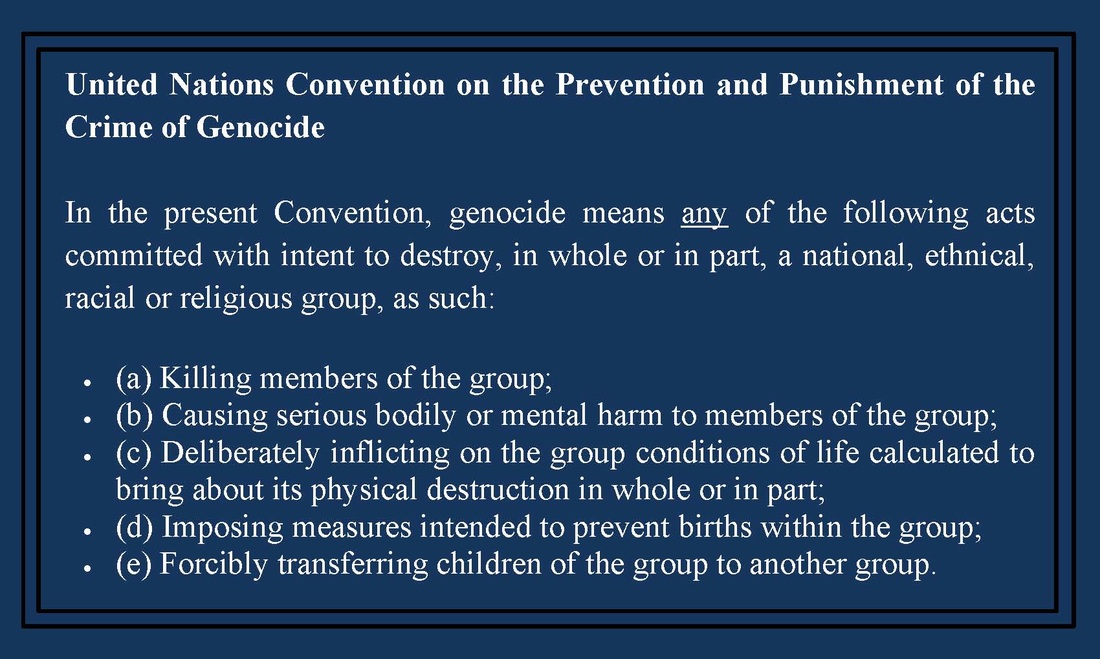|
Cultural Genocide versus Mass Murder Genocide While many people are of the thought that we need to distinguish between what is cultural genocide, where a people are denied their culture, and mass murder genocide, where people are killed on mass, and further that cultural genocide is less destructive than mass murder genocide, this is a naive understanding and an erroneous analysis of what constitutes genocide and also the role that cultural teachings have in making us human beings. First and foremost it is important to acknowledge that Raphael Lemkin, the person who created the very term, defined genocide in socio-cultural-political terms as having two phases: one, the destruction of the national pattern of the oppressed group; and two, the imposition of the national pattern of the oppressor. Mass murder of a group of people is actually not a part of the definition. This is not to say mass murder is not genocide. Of course it is and both forms of genocide are included in the International Convention on the Prevention and Punishment of the Crime of Genocide: On the Word Choice of “Cultural” With the tabling of the Truth and Reconciliation Commission Executive Summary Report and Recommendations there is a buzz about the use of the word “cultural” when discussing genocide, as in it was cultural genocide. Many are of the thought that the use of the word “cultural” as an adjective to qualify the type of genocide that took place implies that a softer form of genocide and as such the word use offends them. These people also likely to argue there is no such thing as cultural genocide. Then there are other people who argue genocide is genocide, it really does not matter if the word “cultural” is used to denote what kind of genocide it was. Further, there are people who know that the use of the word “cultural” actually implies that the type of genocide that took place is a more systemic, all pervading, and thus omnipresent form, and as such adding the word “cultural” carries important meaning. Our Cultural Teachings; All that We Are The main difference between human animals and all the other beings is that humans are dependent on the cultural teachings and knowledge that our parents, grandparents, aunts, uncles, and community members pass on to us once we are born and as we grow up into adulthood. Without our cultural teachings we are not human beings. Rather, we are failed humans in that we are unable to move forward in a good way. Anishinaabeg cultural teachings, for example, guide us through the seven stages of life. These teachings are our medicines in that they serve to protect us from wandering off the path of life into dangerous directions such as places of extreme isolation, gluttony, materialism, and drug or alcohol addiction.  A Teapot Teaching of Cultural Knowledge As an Anishinaabe-kwe dedicated to honouring Anishinaabeg knowledge and dedicated to the process of creating new Anishinaabeg knowledge, my mind moves to what I call “A Teapot Teaching of Cultural Knowledge”. This teaching is short and simple, yet clear in what I want to convey about the role that culture has on the human condition. Our teachings are all that we are as a people. Our teachings are what make us the human beings that we are. In fact it is our dependence on cultural knowledge that differentiates us from the other animal beings and all the other beings. For example, moose and trees are so smart; they are born with all their knowledge. People, though, are like a ‘teapot of culture’ where once you pour out the cultural knowledge the people are gone. There may be a corporeal being but not much else as the people and their cultural teachings are synonymous. Again, our teachings are all that we are. At the same time people are not like a ‘teapot of culture’ where someone can pour out the cultural knowledge and simply pour in new cultural knowledge and stir. Again, when you pour out the cultural knowledge the people are gone. We need to remember that it is the formative years where we absorb our cultural teachings. That said, for someone to suggest that mass murder genocide is worse, and as such the only definition of what is genocide, is to allow the eyes to appropriate and define what can be known, what becomes truth, and consequently what is reality. What I mean by “it allows the eyes to appropriate reality” is that in actual fact genocide achieved through the denial of a people’s cultural knowledge and teachings is much more slithery and insidious in the way it does what it is intended to do, that being terminate the people, yet it is harder to see and perceive. It is my view that genocide by cultural means is more insidious because most people, and for that matter popular culture in general, are unable to perceive and conceptually value the role that culture actually has in terms of making us the human beings we are, and also unable to value who it is that teaches people their cultural knowledge. Being unable to perceive and value the role of culture in a conceptual sense, and thus being unable to think critically about the role it has on shaping and making us the humans we are, results in a misconstrued view that a genocide that relies on destroying a people’s culture is a softer form of genocide, if it is genocide at all. Cultural Genocide Means Sinister not Softer So while people think it is important to distinguish between what is cultural genocide and what is mass murder genocide, because the latter is worse, a genocide through imposed cultural denial that occurs right in front of society’s eyes is in some ways more sinister in that it can go on and on and on and on, sometimes for centuries, in the form of culturally destructive, and thus genocidal, educational and health care systems. In fact it can be so insidious that the cultural genocide can be codified in law and policies such as the Indian Act and the Comprehensive Land Claims Policy that are imposed on Indigenous people. Cultural genocide is not softer, in actual fact it is more sinister. Genocide is Genocide I need to say one last thing on this topic. When someone offers the comparative argument that genocide by mass murder is the only genocide that exists because there is tangible proof and evidence, thus implying that genocide by cultural denial is not genocide because it is harder to prove as there is no real evidence, this is rooted in a very narrow understanding of what can be known, what becomes truth, and consequently what is reality. Western philosophy and its practices and processes of knowledge, such as what constitutes evidence and what is truth and reality, is no longer acceptable. It is making a mess of Mother Earth and all the beings, humans included. More enlightened people no longer value knowledge in these narrow terms. It is clear to me that University of Manitoba Professors Rodney E. Clifton and Hymie Rubenstein, and Conrad Black are all in need of enlightenment. To read their disgorge, versus some steeped tea wisdom, here are the links: http://news.nationalpost.com/full-comment/clifton-rubenstein-debunking-the-half-truths-and-exaggerations-in-the-truth-and-reconciliation-report http://news.nationalpost.com/full-comment/conrad-black-canadas-treatment-of-aboriginals-was-shameful-but-it-was-not-genocide  Lynn Gehl, Ph.D. is an Algonquin Anishinaabe-kwe from the Ottawa River Valley. She has a section 15 Charter challenge regarding the continued sex discrimination in The Indian Act, and is an outspoken critic of the Ontario Algonquin land claims and self-government process. She has three books: Anishinaabeg Stories: Featuring Petroglyphs, Petrographs, and Wampum Belts, The Truth that Wampum Tells: My Debwewin of the Algonquin Land Claims Process, and Mkadengwe: Sharing Canada's Colonial Process through Black Face Methodology. You can reach her at [email protected] and see more of her work at www.lynngehl.com.
3 Comments
Sunne Young
6/9/2015 09:28:52 am
This is a very serious subject that requires our awareness, acknowledgement and action in order to stem the violence.
Reply
Isabella Bardoel
12/28/2015 04:00:34 pm
I very much appreciated and agree with your blog on "cultural" genocide, as it relates to the oppression and experience of indigenous peoples in Canadian residential schools and under other auspices of the despised Indian Act. However, as much as you or I consider cultural genocide as a legitimate and even more sinister form of genocide, it would be incorrect to give the impression that the concept is enshrined in international law, as Lemkin had originally wished it to be. The debate was had, however, the inclusion of cultural genocide was removed from the final UN declaration: "The 1948 Convention on the Prevention and Punishment of the Crime of Genocide prohibits physical and biological genocide but makes no mention of cultural genocide. This omission was deliberate. Early drafts of the Genocide Convention directly prohibited cultural genocide. As the treaty was finalized, however, a debate emerged over its proper scope. Many state representatives drafting the treaty understood cultural genocide to be analytically distinct, with one arguing forcefully that it defied both logic and proportion 'to include in the same convention both mass murders in gas chambers and the closing of libraries.' Others agreed with Lemkin’s broader initial conception that a group could be effectively destroyed by an attack on its cultural institutions, even without the physical/biological obliteration of its members.
Reply
lynn
12/28/2015 08:46:55 pm
Thank you Isabella
Reply
Your comment will be posted after it is approved.
Leave a Reply. |
|
To subscribe to Lynn's Blog: click here
To subscribe to Lynn's Newsletter: click here To follow Lynn on her Public Facebook Page: click here To subscribe to Lynn's YouTube channel: click here To book Lynn as a speaker: click here To contact Lynn/License her work: click here Copyright Dr. Lynn Gehl, 2024 All Rights Reserved
|


 RSS Feed
RSS Feed
